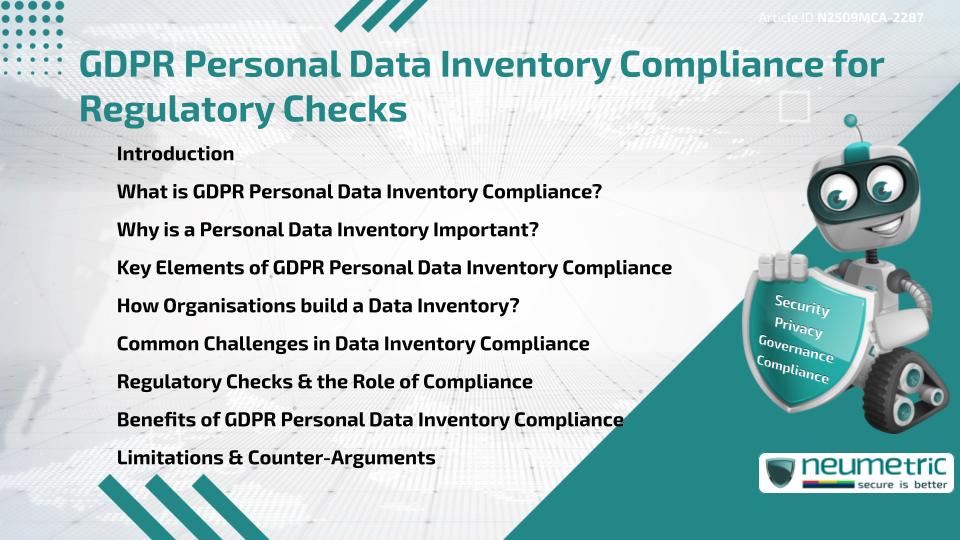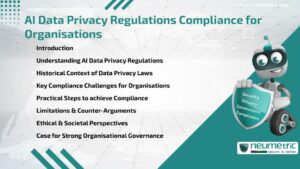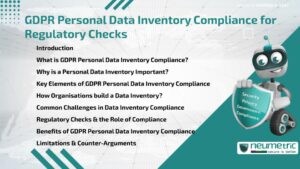Table of Contents
ToggleIntroduction
GDPR Personal Data inventory compliance is a structured process that helps Organisations identify, classify & manage the Personal Data they collect & process. It plays a central role during regulatory checks because it shows that businesses understand what data they hold, where it flows & how it is protected. Without a clear Personal Data inventory, Organisations Risk fines, reputational damage & operational disruption. This article explores the meaning of GDPR Personal Data inventory compliance, why it matters, how it is built, common challenges, its benefits & limitations.
What is GDPR Personal Data Inventory Compliance?
GDPR Personal Data inventory compliance refers to the alignment of an organisation’s data documentation practices with the requirements of the General Data Protection Regulation [GDPR]. It involves maintaining accurate records of Personal Data processing activities, which can be audited by supervisory authorities. A Personal Data inventory serves as the foundation of compliance because it outlines the “who, what, where, why & how” of data use.
Why is a Personal Data Inventory Important?
A Personal Data inventory acts like a map of information within an Organisation. Just as a city map helps travelers navigate roads & avoid getting lost, a data inventory allows businesses to navigate the flow of Personal Data. This visibility is crucial for meeting GDPR obligations such as data minimization, purpose limitation & security safeguards. Regulatory checks often begin by reviewing whether an organisation has such an inventory, making it a vital Compliance Tool.
Key Elements of GDPR Personal Data Inventory Compliance
Several elements define an effective inventory:
- Categories of Personal Data such as names, emails, addresses & Financial records.
- Purpose of processing to clarify why data is collected.
- Legal basis for processing under GDPR, such as consent or legitimate interest.
- Data retention timelines that specify how long data is kept.
- Data sharing details covering transfers to third parties or outside the European Union.
- Security Measures that safeguard the information.
Together, these components ensure that Organisations are transparent & accountable.
How Organisations build a Data Inventory?
Building a data inventory often requires collaboration across departments. Information technology teams track databases, human resources manage Employee records & marketing departments handle Customer Information. Organisations may use spreadsheets, automated discovery tools or Governance platforms to record the details. The process is ongoing rather than one-time because new systems & activities frequently introduce new data.
Common Challenges in Data Inventory Compliance
While essential, maintaining GDPR Personal Data inventory compliance can be challenging. Large Organisations often struggle with fragmented systems where data is stored in multiple locations. Smaller businesses may lack resources or expertise to build comprehensive inventories. Another hurdle is keeping records updated, especially when Business Operations change rapidly. Despite these difficulties, failure to maintain an inventory may attract regulatory scrutiny.
Regulatory Checks & the Role of Compliance
Regulatory checks under GDPR are designed to ensure Organisations comply with the principles of Privacy protection. Supervisory authorities may request access to data inventories as Evidence of accountability. A well-maintained inventory demonstrates transparency & reduces the Likelihood of penalties. In contrast, poor or missing records can lead to questions about compliance & trustworthiness.
Benefits of GDPR Personal Data Inventory Compliance
Organisations that comply with data inventory requirements gain multiple advantages:
- Stronger trust from Customers who value Privacy.
- Reduced legal Risks by proving accountability during audits.
- Operational efficiency through a clearer understanding of data flows.
- Better Risk Management by identifying Vulnerabilities early.
These benefits extend beyond legal compliance, enhancing overall organizational performance.
Limitations & Counter-Arguments
Some critics argue that GDPR Personal Data inventory compliance can be resource-intensive, especially for small & medium enterprises. The time & effort needed to document data may seem disproportionate to the benefits. Others suggest that inventories are only as effective as the organisation’s commitment to keep them accurate. If neglected, an inventory may become outdated & provide a false sense of security. These limitations highlight the importance of continuous maintenance & realistic resource planning.
Takeaways
GDPR Personal Data inventory compliance ensures that Organisations can demonstrate accountability during regulatory checks. It helps businesses protect Personal Data, reduce Risks & maintain trust. While the process can be demanding, its benefits outweigh the challenges when managed properly.
FAQ
What is included in a GDPR Personal Data inventory?
It includes categories of Personal Data, purposes of processing, legal bases, retention periods, sharing details & Security Measures.
How often should a Personal Data inventory be updated?
Organisations should update their inventory whenever data processing activities change, ideally reviewing it at least once a year.
Is GDPR Personal Data inventory compliance mandatory?
Yes, maintaining records of processing activities is a legal requirement under GDPR for most Organisations.
Can Small Businesses comply without expensive tools?
Yes, smaller businesses can use spreadsheets or simple documentation methods as long as they capture the necessary details.
What happens if a company fails a regulatory check?
Failing a check may lead to warnings, fines or orders to change practices depending on the severity of non-compliance.
Who is responsible for maintaining the Personal Data inventory?
The responsibility typically lies with Data Protection officers, compliance managers or designated staff across departments.
Does a Personal Data inventory replace other GDPR documents?
No, it complements other documents such as Privacy notices, Policies & Data Protection impact assessments.
Need help for Security, Privacy, Governance & VAPT?
Neumetric provides organisations the necessary help to achieve their Cybersecurity, Compliance, Governance, Privacy, Certifications & Pentesting needs.
Organisations & Businesses, specifically those which provide SaaS & AI Solutions in the Fintech, BFSI & other regulated sectors, usually need a Cybersecurity Partner for meeting & maintaining the ongoing Security & Privacy needs & requirements of their Enterprise Clients & Privacy conscious Customers.
SOC 2, ISO 27001, ISO 42001, NIST, HIPAA, HECVAT, EU GDPR are some of the Frameworks that are served by Fusion – a SaaS, multimodular, multitenant, centralised, automated, Cybersecurity & Compliance Management system.
Neumetric also provides Expert Services for technical security which covers VAPT for Web Applications, APIs, iOS & Android Mobile Apps, Security Testing for AWS & other Cloud Environments & Cloud Infrastructure & other similar scopes.
Reach out to us by Email or filling out the Contact Form…





